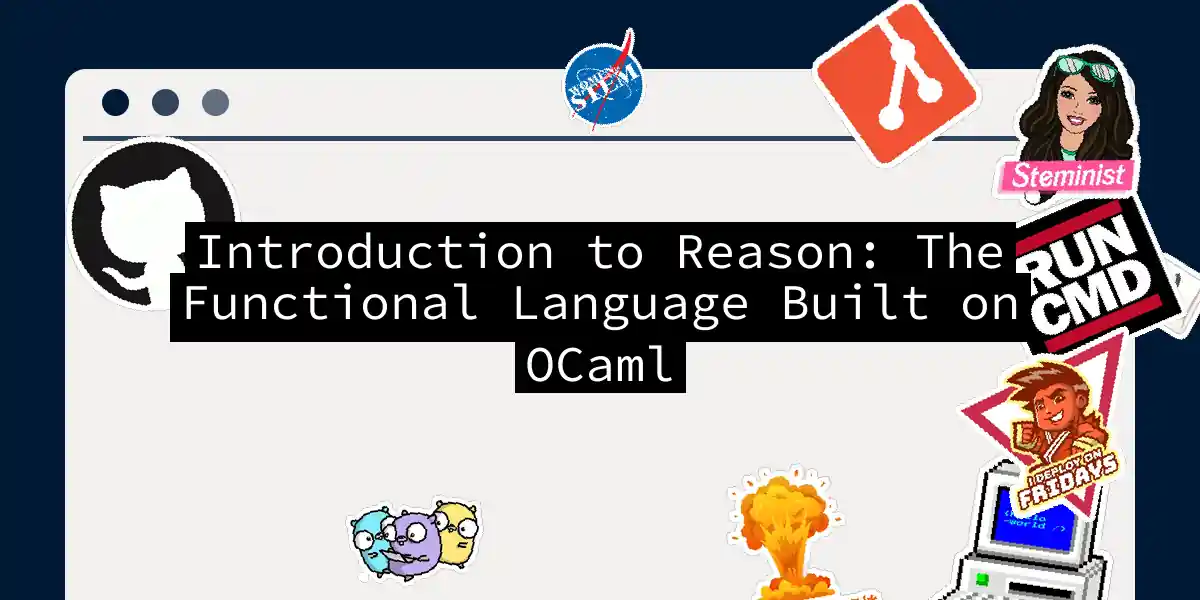Why Reason?
In the vast landscape of programming languages, there are a few that stand out for their unique blend of functionality, performance, and developer comfort. One such language is Reason, a user-friendly programming language built on the robust foundations of OCaml. If you’re familiar with JavaScript or C-family languages, Reason is about to become your new best friend.
The OCaml Connection
Reason is not a new language but rather a more approachable and JavaScript-like syntax for OCaml, a functional programming language that has been around for over 20 years. OCaml is known for its multi-paradigm support, including functional, imperative, and object-oriented programming.
What Makes Reason Special?
Strong Type System
One of the standout features of Reason is its robust type system, inherited from OCaml. This system ensures that there are no runtime type errors after type checking, providing strong type inference that rarely requires manual type annotations.
Immutability and Functional Programming
Reason is a practical functional programming language that offers a powerful blend of functional programming capabilities with optional support for mutation and side effects. This makes it both pure and practical, allowing developers to opt-in for side effects and mutations when necessary.
Fast Compiler
The compiler for Reason is incredibly fast, ensuring quick and safe iteration cycles. It only compiles the necessary files each run, making development efficient and streamlined.
JSX Support
Reason includes first-class JSX support, which is an embeddable XML-like syntax used to describe UI components. This integrates seamlessly with the rest of the language, making it ideal for web development.
Portability
Reason can be compiled to native code, bytecode, and JavaScript, with ongoing plans for WebAssembly support. This versatility allows developers to write code that can run in various environments, from browsers to mobile devices.
Getting Started with Reason
Setting Up Your Environment
To start using Reason, you need to set up your development environment. Here are the steps:
- Install Node.js and npm: Reason uses Node.js and npm for package management.
- Install the Reason CLI: Use npm to install the Reason CLI.
npm install -g reason-cli - Initialize a New Reason Project: Use the Reason CLI to create a new project.
reason init myreasonproject cd myreasonproject
Basic Syntax and Examples
Reason’s syntax is designed to be familiar to JavaScript developers while maintaining the power of OCaml.
Variables and Functions
Here’s an example of declaring variables and defining a simple function in Reason:
let add = (a, b) => a + b;
let result = add(6, 9);
Js.log(result); // Outputs: 15
Pattern Matching
Pattern matching is a powerful feature in Reason, similar to OCaml. Here’s an example:
let greet = (name) =>
switch (name) {
| "Alice" => "Hello, Alice!"
| "Bob" => "Hi, Bob!"
| _ => "Hello, stranger!"
};
Js.log(greet("Alice")); // Outputs: Hello, Alice!
Js.log(greet("Bob")); // Outputs: Hi, Bob!
Js.log(greet("Charlie")); // Outputs: Hello, stranger!
Arrays and Lists
Reason supports arrays and lists with a syntax similar to JavaScript but with the added safety of OCaml’s type system.
let numbers = [|1, 2, 3|];
let sum = numbers |> Array.reduce((a, b) => a + b, 0);
Js.log(sum); // Outputs: 6
Compiling to JavaScript
One of the most compelling features of Reason is its ability to compile to JavaScript, making it seamless to integrate with existing JavaScript projects. This is achieved through the BuckleScript compiler.
Here’s how you can compile a Reason file to JavaScript:
- Install BuckleScript:
npm install --save-dev @glennsl/bucklescript - Compile Your Reason Code:
bsc -o output.js input.re
This will generate a output.js file that you can use in your JavaScript projects.
Using Reason with React
Reason is particularly well-suited for web development, especially when combined with React. The ReasonReact library provides a seamless integration with React, leveraging the strong type system and functional programming principles of OCaml.
Here’s a simple example of a ReasonReact component:
[@react.component]
let make = () => {
let [count, setCount] = React.useState(() => 0);
<div>
<p>Count: {count}</p>
<button onClick={_ => setCount(count + 1)}>Increment</button>
</div>;
};
This component uses the useState hook from React and the strong typing of Reason to ensure that the state is managed correctly.
Conclusion
Reason is more than just another programming language; it’s a bridge between the worlds of functional programming and the familiarity of JavaScript. With its strong type system, fast compiler, and seamless integration with React, Reason is an excellent choice for developers looking to leverage the best of both worlds.
Whether you’re building web applications, mobile apps, or just experimenting with functional programming, Reason offers a unique and powerful set of tools to help you achieve your goals.
So, why not give Reason a try? It might just become your new favorite language.
